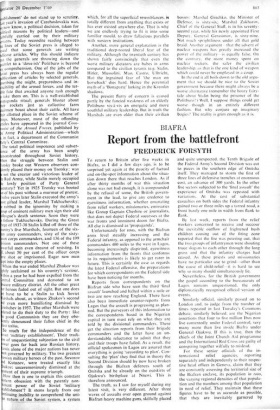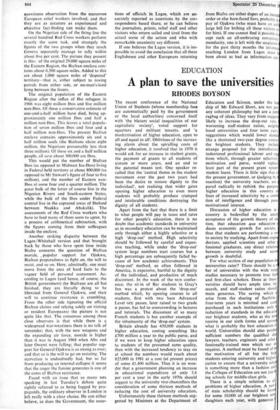BIAFRA
Report from the battlefront
FREDERICK FORSYTH
To return to Britain after five weeks in Biafra, as I did a few days ago, is to be surprised yet again at the paucity of factual and on-the-spot information about the situa- tion down there that reaches London. As if after thirty months of war this situation alone was not bad enough, it is compounded by the refusal of some, the British govern- ment in the lead, to give any credence to eyewitness information, whether emanating from relief workers, missionaries, emissaries like Group Gaptain Cheshire or journalists, that does not depict Federal successes at the war fronts and imminent doom for Biafra. All else is dismissed as 'propaganda'.
Unfortunately for HMG, with the Biafran arms level steadily increasing and the Federal infantry, as opposed to the armchair commanders 400 miles to the west in Lagos, becoming increasingly dispirited, eyewitness information from the fronts that conforms to its requirements is likely to get rarer in future. This is certainly the case as regards the latest Federal offensive, the preparations for which correspondents on the Federal side have been noticing for months.
Reports from correspondents on the Biafran side who have seen the third 'final assault' launched and halted within a mile or two are now reaching England. There have also been immediate counter-reports from Lagos that the assault is progressing as plan- ned. But the purveyors of this information to the correspondents based in the Nigerian capital in turn must rely on what they are told by the divisional commanders. These get the situation reports from their brigade commanders and the latter have an un- derstandable reluctance to admit that they and their troops have failed. As a result, the official spokesmen in Lagos are assured that everything is going 'according to plan'. Con- sulting the 'plan' they find that in theory the Second Division should by now have broken through the Biafran defences south of Onitsha and be already on the outskirts of Ojukwo's birthplace at Nnewi. This is therefore announced.
The truth, as I saw for myself during my latest visit, is very different. After three waves of assaults over open ground against Biafran heavy machine guns, skilfully placed and quite unexpected, the Tenth Brigade of the Federal Army's Second Division was cut to pieces in the southern edge of Onitsha itself. They managed to storm the first of three lines of defensive trenches at enormous cost, an advance of 300 yards. In the other five sectors subjected to the 'final assault' the experience of Onitsha was repeated with variations. At the cost of substantial casualties on both sides the Federal infantry gained two or three miles up a tarred road, a front barely one mile in width from flank to flank.
By last week, reports from the relief workers concerned to receive and succour the inevitable outflow of frightened bush children coming out of the firing zone reported that the fire was petering out, that the two groups of infantrymen were shouting truce slogans to each other through the long grass and that the infantry charges had ceased. As these priests and missionaries have no particular axe to grind—other than the cause of child-relief—it is hard to see why so many should simultaneously lie.
Nevertheless, for the British government the gospel according to the bureaucrats of Lagos remains unquestioned, the only diplomatically recognised official version of events.
Similarly official, similarly passed on to London and, to judge from the number of times repeated in last Tuesday's Commons debate, similarly believed, are the Nigerian assertions that four to five million lbos now live contentedly under Federal control, very many more than live inside Biafra under General Ojukwu. If this is true, then the chiefs of the Joint Church Aid programme and the International Red Cross are guilty of conspiring together wilfully to mislead.
For these senior officials of the in- ternational relief agencies, reporting separately and independently to their respec- tive head offices in Geneva, claim that they are constantly assessing the territorial size of
the Biafran enclave, its population in toto,
the varying regional densities of that popula- tion and the numbers among that population
in need of relief. They maintain that these figures have to be as accurate as possible, that they are inevitably garnered by
eyewitness observation from the numerous European relief workers involved, and that they are as acturate as experienced and objective fact-finding can make them.
On the Nigerian side of the firing line the several hundred Red Cross workers perform exactly the same task, and strangely the figures of the two groups when they reach Geneva separately manage to tally within about five per cent. The picture they present is this: of the original 29,000 square miles of the Eastern Region, the Biafran enclave con- tains about 6,500 square miles. Added to this are about 1,000 square miles of 'disputed' territory—that is, either subject to roving patrols from either side, or no-man's-land lying between the fronts.
The original population of the Eastern Region after the influx of Ibo refugees in 1966 was eight million lbos and five million non-Ibos. Of these a conservative estimate of one-and-a-half million have died, being ap- proximately one million Ibos and half a million non-Ibos. This leaves a total popula- tion of seven million Ibos and four and a half million non-Ibos. The present Biafran enclave contains approximately six and a half million souls (the Biafrans claim eight million, the Nigerians presumably less than three million). Of these six and a half million people, all save about 300,000 are Ibos.
This would put the number of Biafran Ibos (as opposed to Midwest Ica-Ibos) living in Federal held territory at about 800,000 (as opposed to Mr Stewart's figure of four to five million), and the number of Eastern non- lbos at some four and a quarter million. The great bulk of the latter of course live in the Nigerian Rivers and South-eastern States, while the bulk of the Ibos under Federal control live in the captured areas of Iboland between Nsukka and Abakaliki. The assessments of the Red Cross workers who have to feed many of them seem to agree, by a procas of arithmetical subtraction, with the figures coming from their colleagues inside the enclave.
Another striking disparity between the Lagos/Whitehall version and that brought back by those who have spent time inside Biafra concerns the question of Biafran morale, „ popular support for Ojukwu, Biafran preparedness to fight on, the will to resist, and so on. Here, admittedly, one must move from the area of hard facts to the vaguer field of personal assessment. Ac- cording to Lagos (and hence, of course, the British government) the Biafrans are all but finished, they are literally dying to be liberated from General Ojukwu, and their will to continue resistance is crumbling. From the other side (ignoring the official Biafran claims and relying solely on visiting or resident Europeans) the picture is not quite like that. The consensus among these close observers is that while there is a widespread war-weariness there is no talk of surrender; that, with the new weapons and the expanding air force, morale is higher than it was in August 1968 when Aba and later Owerri were falling; that popular sup- port for General Ojukwu is as strong as ever; and that so is the will to go on resisting. The starvation is undoubtedly bad, but so far from producing an internal collapse it seems that the anger the famine generates is one of the cores of Biafran resistance.
Faced with an issue that so many MPS speaking in last Tuesday's debate quite rightly referred to as being fogged by pro- paganda, the ordinary observer in London is left really with a clear choice. He can either believe, as does the Government, the asset-- tions of officials in Lagos, which are ac- curately reported as assertions by the cor- respondents based there; or he can believe the journalists, priests, relief staff and other visitors who return soiled and tired from the actual scene of the action and who with remarkable unanimity say different.
If one believes the Lagos version, it is im- possible to avoid the conclusion that all these Englishmen and other Europeans returning
from Biafra are either dupes of an incr., order or else bare-faced liars, probably in pay of Ojukwu (who must have an ass, large bill for bribing all these visitors to for him). If one cannot find it possible to cept such an all-embracing conspiracy mendacity, one is left with the suspicion for the past thirty months the inform reaching London from Lagos must been about as bad as information can



































 Previous page
Previous page